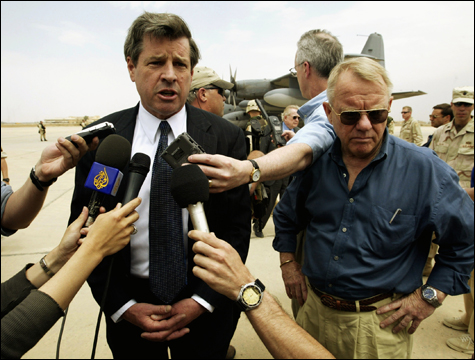
Ambassador L. Paul Bremer and General Jay Garner |
Three years ago, Charles Ferguson’s film might have made a difference. With remorseless clarity and detachment, it lists all the errors made by the Bush administration, starting before the Iraq invasion in 2003 and moving on into 2004: blunders of planning, preparation, and common sense that doomed the misguided mission and pre-ordained the inextricable mess that it is today.
True, back in 2004, Michael Moore’s Fahrenheit 9/11 tipped off voters to the lies underlying the war, but who can trust Michael Moore? So the powers of greed, fear-mongering, megalomania, cowardice, and willful ignorance prevailed, and here we are. “I know with certainty,” Donald Rumsfeld says in praise of his president (in one of several sound bites that run like “The Greatest Hits of the Neo-Cons”), “that over time the contributions you’ve made will be recorded by history.” If this film is the beginning of that record, the judgment of history might be a little harsh.
Perhaps because Fahrenheit 9/11 and other films have already covered this ground, Ferguson doesn’t dawdle over the deceptions, the jingoism, and the scare tactics — all abetted by the media — that made the war possible. He does, however, imply that if the war had been run by non-idiots, it might have turned out okay. That might explain why a “liberal hawk” like George Packer, who initially supported the war, isn’t called to task for his earlier stand. Instead, Packer and the other talking heads outline the falling dominoes of folly that anyone who’s been paying attention knows about already. Under the chapter headings “The Void,” “Things Fall Apart,” and “Chaos,” No End in Sight coldly recounts such fatal decisions as the failure to combat the looting following the fall of Baghdad and Paul Bremer’s disbanding of the Iraq army in 2004. Had Saddam planned the Coalition’s occupation “policy,” it could not have gone any worse.
So, that’s history. You can infer from the film’s title that Ferguson doesn’t have any solution to offer. Rather, he ends the film on an ambiguous note. A young Marine officer who has been testifying to his disillusioning experience during the war asks the camera rhetorically, “Is this the best America can do?” But what is he responding to? The administration’s record? The media’s ineffectuality? Or is he warning us that if we withdraw before “the job is done,” the battered US military will have fought and died in vain? That notion added several years and several thousand casualties to the toll of Vietnam. What we could use now is a documentary that gets it right before it’s too late to mean anything.